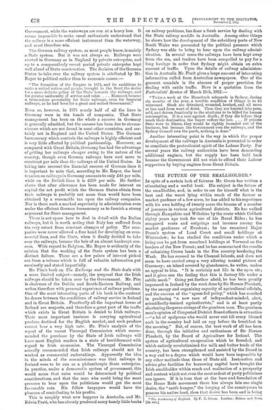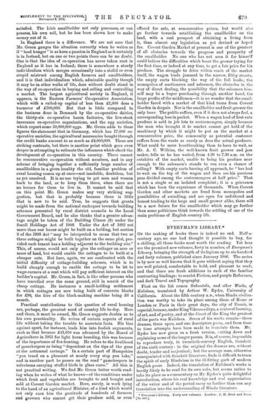THE FUTURE OF THE SMALLHOLDER.*
IN spite of a certain lack of fairness Mr. Green has written a stimulating and a useful book. His subject is the future of the smallholder, and, in order to see for himself what is the best and the worst lying within reach of the farmer or market gardener of a few acres, he has added to his experience with his own holding of twenty acres the lessons of a number of journeys in various agricultural districts. He has walked through Hampshire and Wiltshire by the route which Cobbett eighty years ago took for one of his Rural Rides ; he has compared rents and outgoings and incomes among the market gardeners of Evesham ; he has examined Major Poore's system of Land Court and small holdings at Winterslow ; he has studied the conditions under which a living can be got from moorland holdings at Verwood on the borders of the New Forest; and he has summarized the results of colonizing Crown lands in the Fen country bordering the Wash. He has crossed to the Channel Islands, and does not seem to have carried away a very alluring mental picture of Guernsey ; an island covered by glasshouses, he writes, makes no appeal to him. "It is certainly not life in the open air; and it gives one the feeling that this is factory life under a subtle mask." Going yet further afield, be has been greatly impressed in Ireland by the work done by Sir Horace Plunkett, by the energy and organizing capacity of agricultural officials, and the success of the "spoon-fed policy," which has resulted in producing " a new race of independent-minded, alert, scientifically-trained agriculturists," and is at least partly shortening thepurse-strings of the gombeen man. The gombeen man's opinion of Congested District Board officers is attractive —" a lot of spalpeens who would never rest till every blessed cock in the country had laid an egg before its breakfast in the morning." But, of course, the best work of all has been done, through the initiative and enthusiasm of Sir Horace Plunkett, by the Board of Agriculture for Ireland. The system of agricultural co-operation which he founded, and which entirely revolutionized the milk and butter trade of the country, has been strengthened and assisted by the Board in a way and to a degree which would have been impossible by any other methods than those of State aid. Instruction and advice plus facilities for borrowing capital have brought the Irish smallholder within reach and realization of a prosperity and content which not even the most ardeiit of party politicians can ignore. If it is true that at the base and foundation of the Home Rule movement there has always lain one single desire, the "earth hunger," the longing of the countryman to possess his native land, then that desire has been and is being • The Awakening of .England. By F. E. Green. London: Nelson and Sone. [2s. net.]
satisfied. The Irish smallholder not only possesses, or can possess, his own soil, but he has been shown how to make money out of it.
In England there is a difference. We are not sure that Mr. Green gauges the situation correctly when he writes as if " land hunger " is as keen a passion in England as it certainly is in Ireland, but on one or two points there can be no doubt. One is that the idea of co-operation has never taken root in England as it has in Ireland; there is somewhere a sturdy individualism which merges occasionally into a stolid or even stupid mistrust among English farmers and smallholders, and it is that individualism which, admirable quality though it may be in other walks of life, does without doubt stand in the way of co-operation in buying and selling and controlling a market. The largest agricultural society in England, it appears, is the Eastern Farmers' Co-operative Association, which with a called-up capital of less than £1,000 does a turnover of £300,000. But that is little compared to the business done in Denmark by the co-operative dairies, the thirty-six co-operative bacon factories, the live-stock insurance co-operative organizations, and the egg societies, which export some 50,000,000 eggs. Mr. Green adds to these figures the statement that in Germany, which has 17,000 co- operative societies, the agricultural necessaries bought through the credit banks amount to as much as £4,000,000. These are striking contrasts, but there is another point which goes even deeper in attempting to estimate the influences which check the development of co-operation in this country. There cannot be remunerative co-operation without numbers, and in any scheme of bringing together a sufficiently large number of smallholders in a given locality the old, familiar problem of rural housing comes up at once—not insoluble, doubtless, but as yet unsolved. It is no use trying to get men and women back to the land, or to keep them there, when there are no houses for them to live in. It cannot be said that on this point Mr. Green makes any very striking sug- gestion, but that is probably because there is little that is new to be said. True, he suggests that grants might be made from the national exchequer towards building schemes presented by rural district councils to the Local Government Board, and he also thinks that a greater advan- tage might be taken of the Building Clause (8) under the Small Holdings Act of 1908. Under the Act of 1892 not more than one house might be built on a holding, but section 8 of the 1908 Act "may be interpreted to mean that two or three cottages might be built together on the same plot, pro- vided each tenant has a holding adjacent to the building site." This, of course, would not only give the cottager an acre or more of land, but would enable the cottages to be built at a cheaper rate. But here, again, we are confronted with the initial difficulty of cottage-building schemes, which is to build cheaply enough to enable the cottage to be let to wage-earners at a rent which will pay sufficient interest on the builder's capital. Mr. Green, in fact, is like other persons who have travelled over the same ground, still in search of the cheap cottage. He instances a small-holding settlement in which cottages are now being built of concrete blocks for £90, the hire of the block-making machine being £6 a month.
Practical contributions to this question of rural housing are, perhaps, the greatest need of country life to-day. Here and there, it must be owned, Mr. Green suggests doubts as to his own practicality. He writes of certain aspects of rural life without taking the trouble to ascertain facts. His bias against sport, for instance, leads him into foolish arguments, such as that because £41,050 was advanced by the Board of Agriculture in 1911 for light horse breeding, this was because of the importance of fox-hunting. He refers to the livelihood of gamekeepers as being "dependent on the tips of the guns at the autumnal carnage." In a certain part of Hampshire "you tread on a pheasant at nearly every step you take," and in another part be passes on the road " gamekeepers in velveteens carrying stuffed birds in glass cases." All this is not practical writing. We find Mr. Green better worth read- ing when he writes of what he knows—of the conditions under which fruit and vegetables are brought to and bought and sold at Covent Garden market. Here, surely, is work lying to the hand of an agricultural Minister, of a kind which would not only earn him the gratitude of hundreds of farmers and growers who cannot get their produce sold, or even offered for sale, at remunerative prices, but would also go further towards establishing the smallholder on the land, with a real prospect of obtaining a living from it, than almost any legislation as yet devised or hoped for. Covent Garden Market at present is one of the greatest of all obstacles towards the progress and prosperity of the smallholder. No one who has not seen it for himself could believe the difficulties which beset the grower trying for the first time, or indeed at any time, to get a fair price for his produce. The struggle to drive within reach of the market itself, the wagon loads jammed in the narrow, filthy streets, the empty carts blocking the way of the full loads ; the monopolies of auctioneers and salesmen, the obstacles in the way of direct dealing, the possibility that the salesman him- self may be a buyer purchasing through another hand, the large profits of the middlemen—it is no wonder that the small- holder faced with a market of that kind turns from Covent Garden in despair. Nor is the smallholder and fruit-grower the only loser. The public suffers, even if it does not always feel, a corresponding loss in pocket. When a wagon load of first-rate produce is sold in job lots to costermongers, simply because the man who brought it to market cannot get hold of the machinery by which it might be put on the market at a remunerative price, the community as potential customer suffers from the waste as surely as does the actual producer. What could be more heartbreaking than to have to wait, as Mr. A. C. Wilkins, the well-known fruit grower and jam maker, tells us he has waited, from 4.30 to 7.30 a.m. on the outskirts of the market, unable to bring his produce near enough to the salesmen's stands to run even a chance of selling P With empty carts barring all approach, he " has had to wait on the top of the wagon and then see his precious peas divided among the costermongers at half price." That is not a single or an isolated complaint ; it is a grievance which has been the experience of thousands. When Covent Garden and other markets are freed from monopolies and possibilities of swindling, and are open for unfettered and honest trading to the large and small grower alike, there will be a new future for the smallholder which may go further than some politicians think towards the settling of one of the main problems of English country life.



























































 Previous page
Previous page